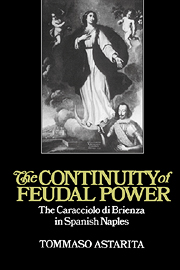Book contents
- Frontmatter
- Contents
- List of plates, figures, and maps
- List of tables
- Acknowledgments
- Note on abbreviations and measurements
- Introduction
- 1 The Caracciolo di Brienza
- 2 Structure and evolution of an aristocratic patrimony
- 3 The management of an aristocratic landed patrimony
- 4 The feudal lord and his vassals: between traditional paternalism and change
- 5 Aristocratic strategies for the preservation of family wealth
- 6 Offices, courts, and taxes; the aristocracy and the Spanish rule
- Conclusion
- Glossary
- Appendix on sources
- Bibliography
- Index
- CAMBRIDGE STUDIES IN EARLY MODERN HISTORY
Introduction
Published online by Cambridge University Press: 28 August 2009
- Frontmatter
- Contents
- List of plates, figures, and maps
- List of tables
- Acknowledgments
- Note on abbreviations and measurements
- Introduction
- 1 The Caracciolo di Brienza
- 2 Structure and evolution of an aristocratic patrimony
- 3 The management of an aristocratic landed patrimony
- 4 The feudal lord and his vassals: between traditional paternalism and change
- 5 Aristocratic strategies for the preservation of family wealth
- 6 Offices, courts, and taxes; the aristocracy and the Spanish rule
- Conclusion
- Glossary
- Appendix on sources
- Bibliography
- Index
- CAMBRIDGE STUDIES IN EARLY MODERN HISTORY
Summary
From all parts of the castle, the lord enjoys the happiest view of the countryside, dominating from it his entire village.
(From a 1625 description of Brienza)The view of Southern Italy and Sicily held by educated Italians and Europeans is heavily shaped by literary images, ancient and modern. It is hard, perhaps pointless, to escape the suggestions of Carlo Levi's memoirs, of Verga's novels, of Lampedusa's Gattopardo, not to mention rural sociologists, who depict a world of millennial traditions, of immobile, proud backwardness, of resigned and internalized hostility to, and alienation from, public authority. Still today, many parts of the rural South appear to have changed but little in centuries, whatever the signs of modernity one sees everywhere. Leaving behind the highway in the Vallo di Diano, one reaches the village of Brienza much more easily than did its masters and visitors of old; but the village itself those masters would still recognize. The ruined medieval castle hovers over the remains of the old village, uninhabited after the earthquake of 1980, and climbing on its walls, one visually dominates vast fields, hills, and pastures. The way to the neighboring villages is harder, as it climbs over hills and mountains.
- Type
- Chapter
- Information
- The Continuity of Feudal PowerThe Caracciolo Di Brienza in Spanish Naples, pp. 1 - 18Publisher: Cambridge University PressPrint publication year: 1991

